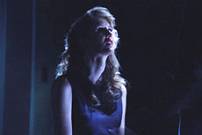|
|
||||
|
|
by Jeffrey Chen  Ah, David Lynch, we meet again. When last I visited you, you confounded me with Mulholland Dr., but the encounter eventually turned into something sweet -- my eyes were opened, and I learned to willingly engage the radically different, unfamiliar, and strange. Thus, I stopped to watch your latest, Inland Empire, with a fresh, open mind. And you have confounded me yet again. Your movie is maddening -- its labyrinthine structure, seemingly stitched together from the shredded pieces of about five or six different storylines about the same character (or is it multiple characters, all played by Laura Dern?) makes Mulholland Dr. look as straightforward as a children's book. No single story thread can be found here, although certain elements are revisited again and again -- Polish circus men and prostitutes, the production of a cursed movie, rabbit-people (who are apparently from one of your recent shorts, called Rabbits), screwdrivers, the message "AXXON-N." and Dern alternately having an affair, giving an angry confession, looking frightened, peeking through cigarette-burned holes, and making scary faces. Is this a puzzle to be solved? I think it's simpler than that, Mr. Lynch. You're one of the only directors who understands that a person's mind sees things as only the cinema can represent it. And frankly, what the mind sees doesn't always make sense in a logical way. So you use movie-making to express your concerns, both conscious and subconscious, by weaving a tapestry of images -- relentless closeups of grotesque expressions, shots of dark shadows, overlaying photography, blurs, speed changes -- to create an experience that touches on your obsessions better than words ever could. Here, it's an extension of the themes found in Mulholland Dr. -- an anger at the callous Hollywood system but a love for the movies and the moving image, for the art of synchronizing sounds to those images; the idea of identity becoming loose, deceiving, and unreliable in the land of movies; and an electric connection, borne of both great sympathy for and much sexual appreciation of the movie actress, an occupation not unlike prostitution, where young women are whored out for their looks, to be ogled at by the filmmaking community, only to be disposed of in old age. It's brave of you to put your emotions on the screen like that, to drop us into the nightmarish jumble inside your head without a map. And the more I understand that you're not being random -- you're just being candid about how one of your ideas might happen to lead to the next -- the more engrossing Inland Empire becomes to me. Every time I think about it, it becomes harder to get it out of my own head. At three hours long, though, is your movie too self-indulgent? And aren't you just doing the same kinds of things you've done before, making something of a rehash and giving it the name of a geographical location (in this case, coincidentally, the one where I was born and raised)? At some point, doesn't ending this endlessly twisting film just become an arbitrary decision? Maybe. But you got Inland Empire made without much studio help, obviously more for passion than for profit, and your skills at putting these tonal collages together are simply too good to ever be easily dismissed. (Released by 518 Media Inc. and rated "R" for language, some violence and sexuality/nudity.) Review also posted at www.windowtothemovies.com. |
||
|
© 2026 - ReelTalk Movie Reviews Website designed by Dot Pitch Studios, LLC |



